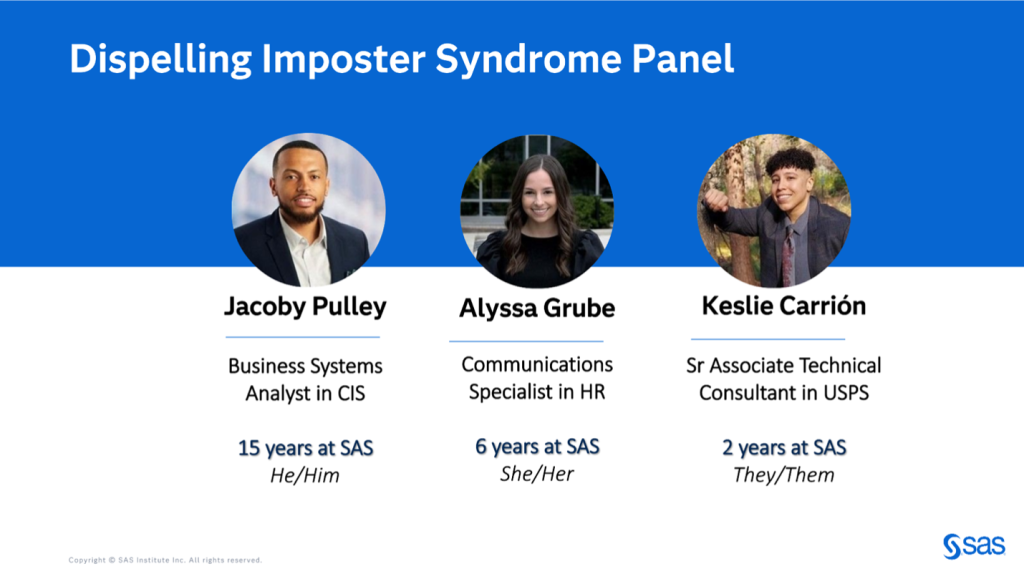Do you feel the need to be flawless in your work to avoid being exposed as an “imposter”?
Do you delay tasks because you fear not meeting your own or others’ expectations?
When you succeed, do you attribute it to luck or external factors rather than your own abilities?
If you answered “yes,” to any of these questions, it could be a sign that you’re experiencing imposter syndrome – the uncomfortable internal experience of believing that you’re not as competent as others perceive OR you believe yourself to be.
Imposter syndrome can strike at any point in someone’s career, but it’s an especially common experience for early career talent and new grads. That’s why our interns recently sat down with several SAS colleagues to hear about their experiences, as part of our summer Diversity Speaker Series.

If you’re struggling with imposter syndrome, check out these tips from our panelists for nipping it in the bud.
Know that you’re in good company.
First off – the group emphasized that almost everyone experiences imposter syndrome at some point. From college to 10+ years into career, everyone on the panel acknowledged feeling the impact of imposter syndrome. Common themes included self-doubt, perfectionism, procrastination and more.
Sound familiar? Keep reading!
Give yourself permission to make mistakes.
Mistakes happen, and failure is a natural risk of innovation and thinking outside the box. Give yourself permission to make mistakes. Value your mistakes as much as your successes, learn from them, and try not to dwell on what you can’t control or change (which, of course, is easier said than done. Overthinker’s club, we see you!).
Admit that it’s OK to *not* know everything.
Whether you’re new to the career scene or a seasoned professional, no one knows it all – there’s always more to learn! Don’t worry about knowing everything – that’s why we have our peers, mentors and others to learn from and grow with. Instead, become a lifelong learner, and let not knowing all the answers drive your curiosity.
Find a mentor in your career path.
If you’re struggling with something like imposter syndrome, sometimes the greatest feeling is hearing someone else say, “I’ve been there.” Imposter syndrome can be isolating and make you feel like you’re the only one experiencing it. Finding a mentor can help broaden your perspective, and they come with a wealth of knowledge. Most mentors will have been where you are and will be able to provide valuable advice and insight.
Not sure where to start with finding a mentor? SAS has a Career Mentor Program to connect mentors and mentees from across the business, but you don’t need a formal program to identify a mentor – if there’s someone whose story you’d like to hear more about, just ask! You never know where the conversation will go.
Keep lines of communication open.
Be sure to prioritize clear and open communication with your manager through regular 1:1s. Clear communication with your manager regularly will help you develop confidence in your work, and 1:1s are a great time to ask for feedback and ensure you’re on track.
Lean on your community.
As the saying goes, we all get by with a little help from our friends, and work and career are no exception! Look for opportunities to collaborate with others and build a supportive network that encourages you and fills your cup. Good community helps develop lasting connections and enhances our sense of belonging, both key to a fulfilling work life. If you’re not sure where to start, consider joining an employee resource group (called “Employee Inclusion Groups” at SAS) or another networking group, like Toastmasters.
Seek help if you need it.
Still feeling stuck? Professional counseling and therapy can provide helpful life and career guidance, especially during times of transition and change. At SAS, our Work/Life team of master’s level trained Social Workers is available to support employees with a variety of resources and can even help with finding a therapist.
If you’re struggling with feeling like an imposter, we hope these tips will help you refocus and reframe. Nearly everyone will feel some doubt or “imposter-ism” throughout their career journey – but with the right tools and a supportive network, we can all work towards growth.
Do you have a great tip for thwarting the pesky voice of imposter syndrome? Let us know in the comments! And if you’re interested in our emerging careers programs or other career opportunities at SAS, check out sas.com/careers to learn more and explore open roles.
